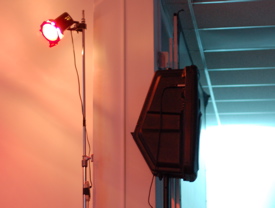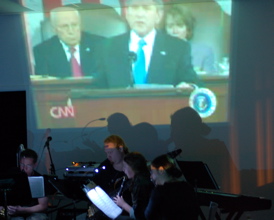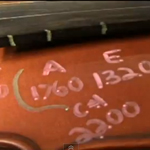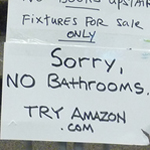Just in case you missed Greg’s directive, when you need some relief from election-day banter today, anyone at all interested in new music should go and read this essay. Seriously. As soon as we get the Obama/McCain decision delivered, we will once again be at liberty to discuss something else. And you’ll want to be able to discuss this.
Main Content
Please Move. You’re Standing On My Heart.

I had the awesome experience of being connected to this little love song project last year. It was 100% amazing to hear our song in concert last Wednesday, and it proved to be one of those nights when the talent of the friends who surround me leaves me speechless (okay, nearly speechless). Maybe that’s why I found the story of this “critic death threat via pop song” so unshakable. How completely unreal yet totally logical would it be if the music that you loved bit you back with such a direct vengeance?
I don’t mean to get all Stephin Merritt on you, but in my own off-line world this week, if it’s not one thing out of left field it’s something else–scary illnesses of loved ones, friends in really tough places, thieves trying to steal things right out of our back yard while I yell from the kitchen window(!!). Still, no matter what happens in the real world, creative projects–whether we’re writing for newspapers or record albums–have a tendency to attach themselves with the sort of emotional seriousness we otherwise reserve for parents, pets, and best friends. But what do you do when your relationship with your art sours, when music tells you off? How do you get all Michael Azerrad and tell art that it’s time for you to have a serious little talk without losing faith?
(Did I mention the mouse in the kitchen? Don’t forget–like you could–to vote!)
Real Love
It’s raining something fierce this afternoon, and there is a long list of things I’m supposed to be working on. But my computer seems to be giving me a psychosomatic headache, so I’ve been procrastinating with a serious intensity.
First, there was the pizza making,

then the furniture assembling,

and then, finally, the pumpkin carving.

I’ve notice lately that I crave creative activity that results in a material object as opposed to an intellectual product. I suspect this may be a reaction to the average 16-hours-a-day I traditionally seem to spend attached to my laptop.
When I was a kid, I really wanted to become a luthier, but it didn’t seem practical and I never pursued it. So is my sudden obsession with crafty projects just a personal thing, or is this a larger 21st-century frustration that many people who work in purely headspace pursuits are confronting? Have you ever suffered from computer dread?
And I-EEE-I Will Always
Not sure if the content of my love life is Top 40 hit song material, but for Corey’s sake, I certainly hope so.
Get the back story here.
Or skip the fine print and just watch the video.
It’s a Miracle!

Point of Conversation

Last night, during a long and winding conversation about music, genre, emotional vs. intellectual processing and cross-derivatives of the two, etc., we wondered aloud about the ways we use music in our personal lives as opposed to the professional. How can you love this? How can you not? Do you pay more attention to the music or the lyrical content? Oh, really, well that explains it!–You know, that sort of thing.
Later on, we specifically spoke about how we use it to decorate the fantasy space in our heads that houses the lives we live and, perhaps of even greater concern, the lives we aspire to. How important is the music itself, and how important is what we feel the music and its extra-musical trappings say about the type of person we are? It’s loosely similar to what reading some particular magazine in public might project. It’s a fool who reads a magazine only so strangers will see and think her a certain type of person, but there is a certain type of person who holds it and knows that others, if they glance her way, will know her for what she is inside. It represents her and her values. If that feels adolescent to you, substitute the type of car you drive, clothes you wear, whatever thing or activity you use to define who you are to the world, even if no one is explicitly paying you any attention whatsoever.
Towards the end of the evening, the question we finally got around to was: Why is this the kind of music that you feel most attached to? The “this” varied by respondent, but the answer distilled down neatly. There are lots of people in the world, many you’d share lunch or a drink with a few times a year and have a very grand time. But only a select group, when gathered close around you, feels truly like home.
With that we ate the last of the peanuts in the dish and cashed out.
It’s All in the Advertising

A holiday handgun promo?!? Because nothing says “I love you, Grandpa” quite like a couple of new clips. Seriously, people, seriously. I know we’re all supposed to be getting into the shopping mood early this year for the good of the tanking American economy and all, but this ad (thanks for ruining my breakfast, junk email!!) just makes a person ill.
I was feeling pretty dispirited, and then I got to thinking about an interview I did the other day with Robert Elmes, the director of Galapagos Art Space in New York. He offered the following:
If the arts can’t show leadership then who can? We can’t be simply bystanders in the midst of what others before us have built. As cultural leaders, we have a deep responsibility to lead not only on culture but on helping society evolve and adapt.
Wars, corruption, Palin, plummeting stock markets, soaring food, gas, and real estate prices, shoddy health insurance. I know a lot of people in the creative class who are feeling completely overwhelmed and trampled down by what’s going on in the world. Elmes’ words were pretty simple, and at first I thought he sounded pretty naive. Then I realized that I was the one being naive.
In the average America’s life, the arts are often pushed into a corner as an “extra”, a nice distraction on par with a beach vacation or a $40 bottle of wine. When it’s time for the serious issues, art is sent upstairs to play while the adults work it out. It’s got me thinking: So much of what Americans think is shaped by the strength of the marketing campaign and the collective image embraced by the participants. Do artists just need to project a different attitude? It sounds ridiculous, but how often do we sell our importance short and, in so doing, project that out to others? Remember that old psych experiment where a class is divided and half become “prisoners” and the rest become “guards”? It’s arbitrary, but people fall into the expectations of their assigned roles quite quickly. Have artists done the same? There’s so much on the line these days and people are looking for leaders. Isn’t it time to step to the front of the pack as a collective force and without apology? Start singing in some food courts for more than laughs. Sounds crazy, but then maybe truly crazy things will happen, resulting in minds opened to new perspectives rather than trapped inside ugly ones.
Hey, Can Boy Bands Be 501(c)3s?
Mind the Gap has received it’s first question! I’ve offered my 2, now it’s your turn.

Dear Mind the Gap,
I really love new music, but a few things about it have me stumped. Non-profit groups like Bang on a Can, Alarm Will Sound, Anti-Social Music, and others celebrate an unprecedented musical diversity. All this suggests an “anything goes” culture–communities without boundaries, etc. My questions: How does an inclusive atmosphere affect the educational status claimed by groups in order to qualify as a not-for-profit? Should pop groups qualify as non-profit organizations, and be eligible for the grants that would accompany this?Â
Signed,
Non-exclusive in Knoxville
***
Dear Non-Exclusive:
The borders have come tumbling down, you are quite right. Some patrons are quite shocked by what this has brought forth. (For instance, one of Counterstream Radio’s listeners wrote in to politely request that we not mix any more of that “jazz music” with the contemporary classical works on the playlist.) In my experience, redrawing the division lines has only been a force for creative and intellectual good. I can’t say if the federal government is keeping up with this trend, but I don’t expect that they are clinging tightly to any classical-only paradigm when their constituencies of “soccer moms” and “joe six-packs” so clearly have not. But that doesn’t mean the PTA is going to go in for taking their classes to bars to hear the local boy band.
In these crazy economic times, of course, everyone is looking closely at what it’s going to take to put food on the table, and not-for-profits do have a number of fund-raising and grant-acquiring perks available to them. However, the rules and regulations for getting 501(c)3 status is rendering the process increasingly difficult, and there are big questions you probably want to ask yourself and your group before attempting it. In addition, there are organizational requirements–the establishment of by-laws, a board of directors, and such–that most of the pop groups I know of would not be interested in pursuing. It’s just not usually part of the culture or the aspirations of the musicians involved in the scene. (Please correct me if I am off base!!) They want to play gigs and make records, not design education programs for the local elementary school.
That said, I don’t think “classical” music is the only genre in town with the ability to promote an educational mission. If that’s what you’re about, I don’t expect that what bin you’re filed in is going to be a stumbling block. But has that theory been tested? Anyone out there front a heavy metal band with a mission to teach math to 3rd graders? I mean, how educational is a symphony concert, anyway? Any 501(c)3 pop groups out there want to give it a test run?
I Am Sitting in a Basement (with Matmos)

Which, if you’re going to sit in a basement, is totally how I’d recommend going about it. (They’ve got enough gear down there for at least three more band members. I was hoping they’d let me stay.)
Matmos (a.k.a. M. C. Schmidt and Drew Daniel) invited me over to their house for a chat about music and, in 2.0 fashion, I brought along a camera and a production crew to document the occasion. We talked about why pop is like junk food, why iTunes is like porn, and why Björk is a star. We also covered how money could kill your music and how making music might make you want to kill the love of your life (and how to best avoid both).
You can watch the video and read the whole transcript here. Like wearing out a mix tape, I’ve read it four times, and I was there.
No Time For Fair and Balanced: Musicians Want You to Rock the (Obama) Vote

This year it seems like the creative class that brought you “Rock the Vote” has taken its “we just want people to participate” gloves off. Will.i.am might have been the first off the block, but now there are the rockers. And the jazzers. Hell, even the thereminists are getting in on the action. In new music land, composers got vocal. Emails went out from the likes of Meredith Monk, La Monte Young and Marian Zazeela in support of the “Women Against Sarah Palin” movement. John Adams sent private emails encouraging recipients to make a donation. Now, I know people don’t think “artist” and “Republican” in the same breath very often, but this time around it’s not just Bono up there in the public pulpit. Everyone seems to be falling in. As my favorite 8th-grade cheerleaders used to say, “Let’s get fired up!”
Okay, political pep talk over. You’d think I’d know better than to bring up such topics at dinner, but I don’t and I have and it’s ruined yet another pot roast. I promise we’ll get back to hard-core musical topics after this. For instance, Mind the Gap has received it’s first advice request! Get ready to correct me when I’m wrong.
UPDATE: But meanwhile, I mean, dear lord.






